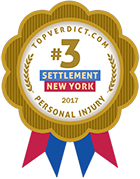Ready to Fight for You
New York Slip and Fall Law: What Is Reasonable Care?
In determining if a property owner exercised a degree of care that is “reasonable,” New York slip and fall law concentrates on whether the owner makes regular and thorough efforts to keep the property safe and clean.
Here are some questions that New York slip and fall lawyers ask to determine whether a property or business owner may be liable for their clients’ slip or trip and fall injuries:
- If you tripped over a torn, broken, or bulging area of carpet, floor, or ground, or slipped on a wet or loose area, had the dangerous spot been there long enough that the owner should have known about it?
- Does the property owner have a regular procedure for examining and cleaning or repairing the premises? If so, what proof does the owner have of this regular maintenance?
- If you tripped over or slipped on an object someone had placed or left on or in the floor or ground, was there a legitimate reason for the object to be there?
- If there once had been a good reason for the object to be there but that reason no longer exists, could the object have been removed or covered or otherwise made safe?
- Was there a safer place the object could have been located, or could it have been placed in a safer manner, without much greater inconvenience or expense to the property owner or operator?
- Could a simple barrier have been created or a warning been given to prevent people from slipping or tripping?
- Did poor or broken lighting contribute to the accident?
Your own carelessness may jeopardize your New York slip and fall case.
In almost every New York slip and fall case, you must decide whether your carelessness contributed to the accident. The rules of “comparative negligence” help measure the degree of care you exercised just before the accident happened.
There are some questions you should ask yourself about your own conduct – an insurance adjuster will almost certainly ask them after you file your claim.
- Did you have a legitimate reason – a reason the owner should have anticipated – for being where the dangerous area was?
- Would a careful person have noticed the dangerous spot and avoided it, or walked carefully enough not to slip or trip?
- Were there any warnings that the spot might be dangerous?
• Were you doing anything that distracted you from paying attention to where you were going, or were you running, jumping, or fooling around in a way that made falling more likely?
How Can We Help You?
Fields marked with an * are required
"*" indicates required fields




